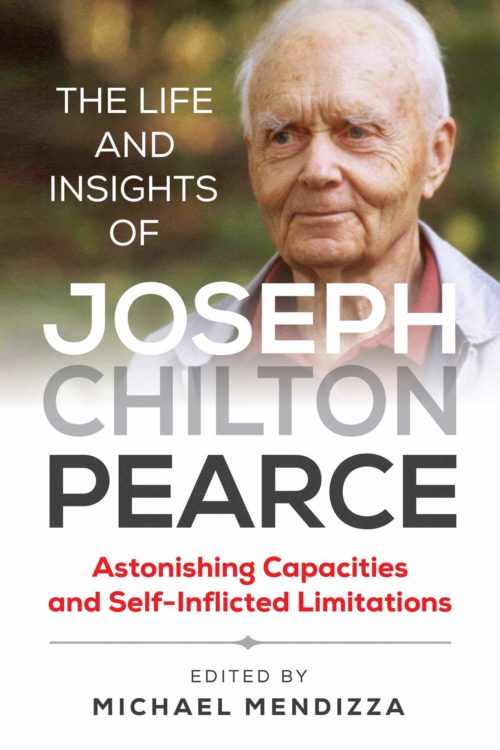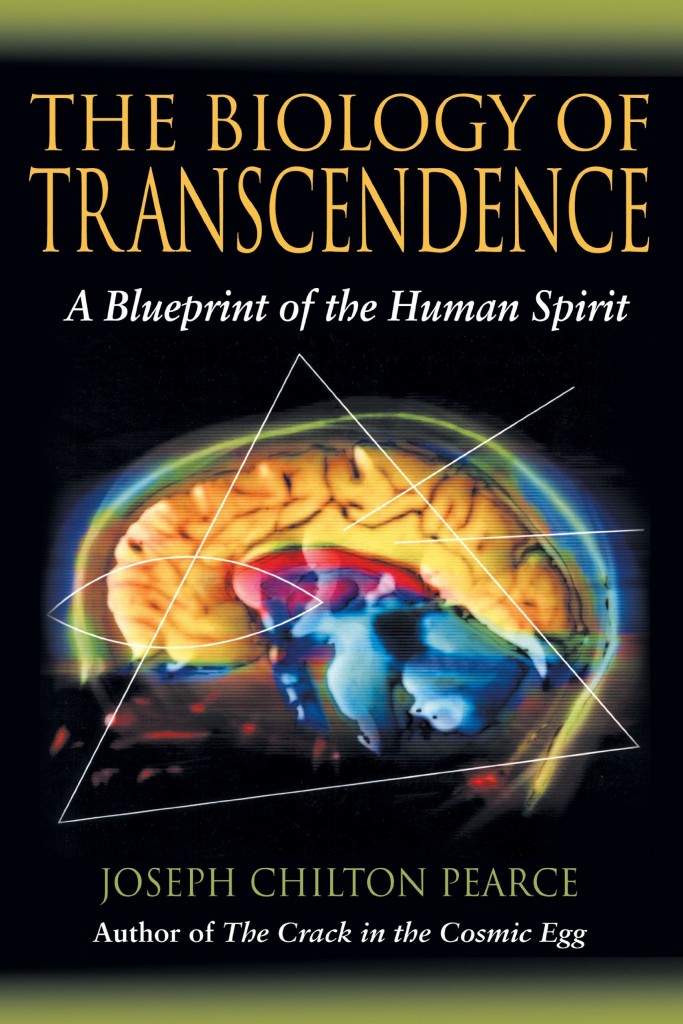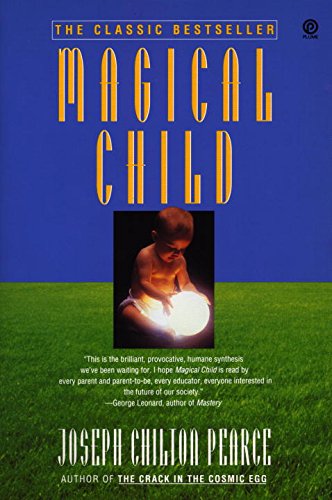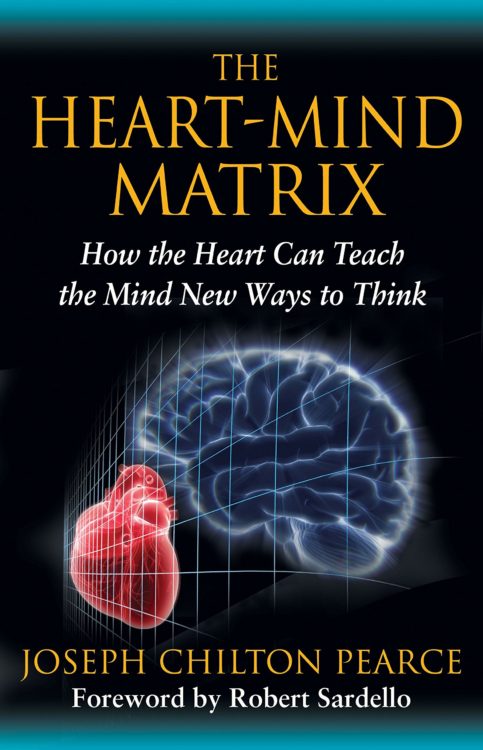About On Insight, an original essay from Joseph Chilton Pearce (the essay is below this introduction)
By Michael Mendizza
To grasp the depth and critical significance of Joe’s narrative On Insight, some background is essential. As you may know, or will soon discover, Insight is a flash of perception and meaning, that emerges in realms beyond conditioned memory that expresses as knowledge and thought, these together being the classic and common definitions of intelligence. It is simple to see that one person’s ‘known,’ or the collective ‘know’ of a culture, is limited compared to the limitless potential implicit in the unknown. Pearce, Physicist, David Bohm, Krishnamurti and others agree, the often clever manipulation of limited conditioning is a capacity, not to be confused with the underlying ‘creative-intelligence’ that renders that cleverness possible.
A clear way of understanding this differences is to appreciate that empathy, compassion, altruism, the capacity for wonder and insight, do not exist as experiences in the realm of abstract thought and knowledge. As concepts, yes. As direct experiences, no. Empathy, compassion, altruism, the capacity for wonder and insight, provide a foundation or context, a moral rudder or compass of appropriateness, that guide conditioning to express in ways that serve those experiences. Knowledge apart from these deeper and more fundamental experience has only itself to use as a subjective guide, a relative reference, and anything goes.
Digging even deeper, the term Insight, implies three different experiences: conditioned memory expressing as thought, guided or not by even more fundamental experiences of relationship; fields of creation and meaning that exist outside of conditioning and thought; and Insight which, like lightening, is experienced as flash of meaning from the unknown, exploding with new meaning and possibilities, into the known.
In today’s context, and central to all of Joe’s collected wittings, is the realization that what we call AI or Artificial Intelligence, and all the technologies involved, are not intelligence, rather a pervasive counterfeit, or CI, Counterfeit Intelligence. The same is true of conditioned memory and thought, with all its social degrees and cultural expressions. Conditioned thought – including all the conditioning imposed by compulsory schooling – on its own, and that is the key, without the guidance of empathy, compassion, altruism, the capacity for wonder and insight, is equally counterfeit, dangerous, and easily mistaken and confused by all.
Joe’s essay, On Insight, is a tip of the Insight iceberg, but a world-class tip it is. To explore further, please see The Limitations of Thought and Knowledge and Insight with David Bohm, in Touch the Future’s Academy. h
Michael Mendizza
Visit the virtual Joseph Chilton Pearce Library at the Touch the Future Academy here.
On Insight
By Joseph Chilton Pearce
No knowledge will spontaneously self-actualize in a child, not even basic survival-maintenance instincts. Regardless of the nature of the knowledge in question, appropriate environmental stimuli must be provided, and, for optimum results, at the appropriate developmental stage. This is nature’s Model Imperative.
For humans, the primary model is the mother, father, family, society; the secondary model is the physical environment. Denied the primary models, access to the secondary is impaired. The work of pediatrician Maria Montessori, (first Italian woman medical doctor) showed, however, that an intelligently designed environment could overcome severe primary deprivations. The earliest Montessori schools were not considered schools at all, but “houses for children”: three to six year olds who had suffered massive neglect in severely impoverished slum families. While the children were treated with love and respect in these Montessori houses, discipline, quiet, and order were hallmarks of life there.
By age five most of these children could read and write with some skill, a phenomenon attracting wide attention. Montessori insisted that these children had not been taught to read, nor to write, (and they wrote before reading.) The spontaneous writing and reading was no more an intentional part of the experiment than a myriad of other capacities and intelligences the children developed as well, all without “teaching”, which was the whole point.
Montessori’s life-work attempted to show that the child’s mind was “naturally absorbent” and would spontaneously unfold if given the appropriate stimuli in an environment of love and trust. She anticipated Howard Gardner’s “multiple intelligence” theory by seventy years in her own theory of “nebulae”, various constellates of intelligence inherent in the nature of mind, which the child absorbed as and if provided the appropriate environmental stimuli.
The proposal of such “nebulae” received far less attention than her procedures that gave rise to an open- ended, rather than closed, form of stimuli. The nurturing environment must include, of course, all cumulative cultural survival experience, but it must include as well access to experience beyond such basic maintenance matters. The nature of this latter kind of stimulation could only arise from each moment of interaction with a child, to escape being but a reflection of the adult’s own limits, as found in our usual maintenance intelligence.
Mistaking information acquisition for education is a major error of contemporary thought. Knowledge, as Montessori pointed out, and David Bohm affirms, is an organic, lived process not itself necessarily translatable into “information” at all. And knowledge, what an unobstructed absorbent mind might experience and become, is open-ended. The problem lies in providing the child with a nurturing environment and open-ended, rather than closed, form of stimuli.
In the late 1970’s I received two lengthy letters from a young man in charge of five and six year olds in an Israeli kibutz. The young man had discovered that these children could do apparently impossible tasks, and with great zeal, to the extent that he, the caretaker, could suspend his ordinary beliefs about what was possible and not possible for them, and direct their actions accordingly, in whatever offered itself moment by moment.
He reported physical accomplishments completely beyond their stature and capacity, as well as intellectual achievements beyond their years. He discovered that children were constrained only by the nature of the belief patterns held by those in charge of them. On their own, they were unlimited. Without cues, suggestions, guidance and caretaking, however, they were lost. The young man expressed dismay and something akin to despair over the extent of this Catch 22 finding. (Somehow my replies and requests for more information were lost and I didn’t hear from him again.)
Bettleheim was right in saying you can’t lie to children since they pick up from you emotional (or implicate) energies as well as the physical signals sent. Children have been led into a-causal, or “nonordinary” phenomena, however, by the example set by a charlatan. In those cases, I know of, the charlatan was simply doing his thing as a magician, and was not aware of his acting as exemplar-model. The entire episode unfolded as a form of play, as with the Israeli chap and his kibutz kids.
The a-causal nature of such examples (metal bending particularly) point up physical processes beyond the norm, whereas the opening question implies moral-ethical issues of an order surely beyond our norm. The key to these higher potentials may lie within David Bohm’s concept of insight, a process discontinuous with Gardner’s multiple intelligences or Montessori’s “nebulae,” both of which refer to “morpho-genetic” fields of intelligence resulting from past human experience.
Insight implies a reservoir of potential that lies beyond all concepts held or information available. Gardner’s intelligences, or Montessori’s nebulae lie within the implicate order, the cumulative results of explicate order phenomena. Insight, I would suggest, springs from the supra-implicate order as stimulated by the implicate order in response to a need or passionate quest within the explicate realm. That is, insight is a function of pure potential, yet a response.
If we are to look to insight as source of a way out of current situations, we need to understand the function. Insight is akin to the so-called Eureka! experience, source of all bona-fide new concepts or “discoveries”, scientific, artistic, or spiritual. This has been the subject of intense study and speculation in our century. First, note that the individual concerned must be seized by a passionate quest for an unknown, and exhaust every avenue of “knowns” that are relative to the quest in any way.
Secondly, the Eureka! falls into the mind only after a “gestation” period following exhaustion of materials for an answer, and at a point of mental blankness, when the passionate quest for that answer has temporarily receded.
All recipients of Eurekas! claim that the answer was unthought and simply arrived out of the blue, and most attribute to it some numinous quality. Thirdly, the “content” or nature of a Eureka always proves discontinuous with the sum of all knowns and/or relative materials (information, techniques, capacities, etc.) gathered by the individual in the long quest leading to the breakthrough Eureka! itself. (That the idea breaking through need bear no resemblance to any of the so-called materials or information leading to it is a key point.)
Next, only a mind that has undergone the long discipline demanded by a passion strong enough to trigger a Eurkea! is in a position to receive that answer – though the answer itself lies at a discontinuity with any discipline, capacity, or knowledge leading up to it, and in spite of the fact that the Eureka! can break into that mind only at a momentary cessation of mental action.
Fourth, only a mind so disciplined by the long quest is in a position to “translate” the answer into the common domain when it arrives – and so realize it or give it life. Eurekas! usually appear in the mind in symbolic-metaphoric fashion which would be meaningless to any mind other than the one triggering the experience.
Fifth, and a final issue, the realized answer then creates its own environment. The new idea will be true to the extent it proves functional in the common domain, but, it proves functional by changing that common domain; as needed by its own accommodation within that domain. That is, the Eureka!, being causal, is never just an answer to an explicate passion, but enters into the creative process giving rise to the explicate order itself. Thus its “realization” creates a different environment than existed before that Eureka!
The Eureka! phenomenon produces as many non-translatable as translatable experiences, however, as many misses as hits. As a function it displays no “judgmental” aspects. It simply responds to passionate quest sustained long enough. Consider Bergman’s observation that each and every problem we face today is the direct and inevitable result of yesterday’s brilliant solutions.” This must, of necessity, include Eureka’s themselves.
That is, a new “truth” is true only as it can change the environment as needed for its appearance – which appearance is then true. (A day will come when the notion of quantums and such is seen as primitive and quaint, though these postulates function for us as well as phlogiston managed to keep the home fires burning in times past.)
Thus the horns of a dilemma: The nature of a quest gives rise to the nature of the insight given, though the final insight lies beyond the problem-quest giving rise to it, and indeed may be radically removed from the grounds of such birth. Of course Kekule “see” a chemical process, Hamilton mathematical, Poincare geometric, Einstein temporal-spatial, Gould an optical-physical one etc.
The nature of insights demand, and if successfully translated, bring about, a new milieu. And the nature of that milieu may be beneficial or demonic. Hamilton’s quaternions underlie virtually all modern mathematics by which we transform our world” in catastrophic form.
Kekule’s benzene ring is the foundation on which modern chemistry is based, giving us our 9,000 new carcinogenic chemicals yearly and an annual 100 million tons of toxic chemical waste, and so on. The realm of insight is “nonjudgmental”, non-qualitative, a creative function that rains on just and unjust equally. Discrimination, evaluation, quality, is a product of the human mind that experiences the results of random creativity. That creative realm lying beyond is not just potentially a-causal but a-moral.
To Bohm’s concept of insight, then, we must add another insight of his, made years ago: that beyond explicate, implicate, or supra-implicate, lies the “realm of insight-intelligence”. Insight as itself, being causal, gives newness; beyond the structures leading to it – but without qualification. Arriving “out of the blue” we accept an insight as sacrosanct and act on it with the passionate conviction of its trueness.
Which passionate conviction-action realizes the insight, gives it translation into flesh and blood – a flesh and blood profoundly affected by the nature of the translated insight. (It may take generations to discover that the results of our divinely inspired truth is destructive.)
Beyond insight as function, then, lies intelligence, which, to distinguish it from intellect or insight, is a movement of well-being. No insight originating from intelligence can act-back against its recipients in some slow-grinding of the gods. From the realm of insight-intelligence arises newness beyond the parameters of the reality giving rise to it, but only a beneficent newness, one without side effects. The truly good.
The traditional word for the good – that which acts only beneficially for all equally – is God. Leave God out of your equation, and you are stuck with your own limits, though they eternally appear under new dress.
Since the word God has been sullied past redemption, perhaps we might use Bohm’s Insight-Intelligence, which is, after all, a rather sublime term in its own right. But get that qualifying intelligence in there. Insight alone is not enough. Insight reflects our passions and may give us what we ask for – to our rue. Intelligence reflects our needs, discriminated from our wants, desires, and tragic limitations.
To open to intelligence as well as its instrument, insight, we need only acknowledge the limits of our intellect, and then acknowledge the unknown, but open-ended possibility of a greater intelligence behind the show, which is, after all, what Bohm’s dialogue process implies.
Then we would find not so much an “answer” to today’s dilemma – which would have its limitations – as a renewable source of a “deeper knowledge” our children, and all generations need as constant referent. None of us can explicitly display such knowledge as itself, since we can neither contain it nor produce it. We can, however, acknowledge that such a realm exists, simply awaiting our opening of self to it.





